Doha (Qatar). “We need your help. A brother hasn't been paid for give months. He's asking for his salary from his employer who in retaliation has driven him out of the labour camp. He's got nowhere to go.”
The phone had rung just after 'Muhammad' – not his real name – had collapsed with exhaustion in his windowless bedroom, worn out by work, the heat and the humidity. Earlier that day the thermometer had touched 44 degrees centigrade. Never in the nearly ten years he has spent in Qatar has he known such an unbearable summer. Just a few days earlier they had been working through antediluvian rain in the middle of the dry season, something previously unimaginable.
But despite his exhaustion Muhammad does not hesitate for a second. “Send me his location, I'll make sure he's safe,” he replies to the caller. He gets up from his bed - a mattress lying directly on the tiles - sprays himself with water and opens his Uber app to find a driver.
An hour later he is welcoming and comforting a large, distressed beanpole of a man, his hands lined from hard work, who has arrived at Muhammad's miserable shared accommodation. 'Hari', aged 33 – like all the workers quoted in this article this is not his real name - is working on one of the massive building sites at Lusail, the new city ten miles from the skyscrapers of Qatari capital Doha, a futuristic dystopia and representation of depraved luxury that has sprung up out of the desert sands. This new city is where, from November 20th to December 18th this year, the most sought-after matches of the World Cup will take place, including the final.
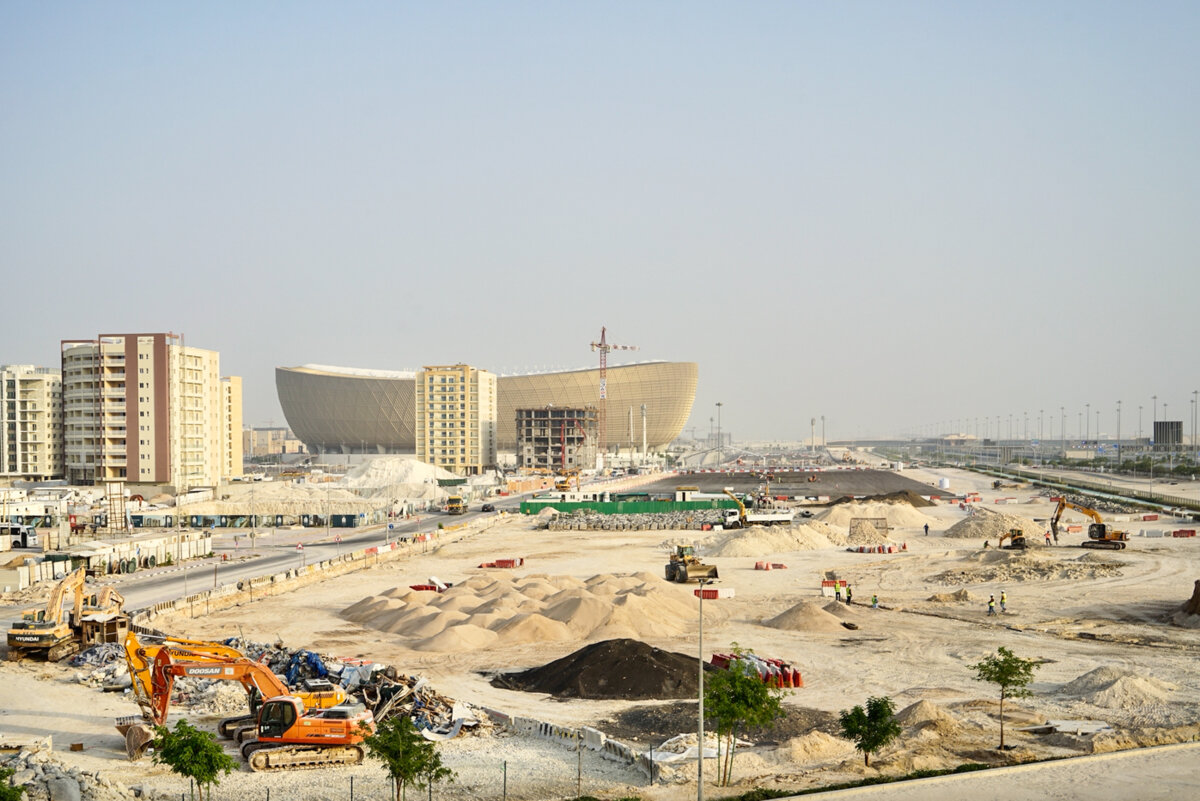
Enlargement : Illustration 1

These fixtures will take place in one of the most modern and extravagant stadiums in the world, built for the event at the same time as the rest of the city's buildings, motorways, hotels, golf courses, metro, tramway and marina. The new urban area will even have its own 'place Vendôme' - an entertainment district based on the high-end shopping area of Paris of the same name.
The new sports venue itself is called the Iconic Stadium. It will have a capacity of 80,000 fans seated inside its removable bowl design, a shape which was inspired by the hulls of dhows, the traditional boats that still sail just off the coast. These craft were once used for pearl fishing when Qatar scraped a living from this natural resource, before evolving into an oil and gas giant.
Today this territory the size of the Paris region is one of the richest states in the world with the highest per capita GDP and the most striking ratio of foreigners to nationals; out of the 2.8 million inhabitants, 90% are foreign workers.
Several thousand workers have died
In what is an allegory of unbridled capitalism it is building its fortune – and for 12 years the infrastructure for football's top competition – by exploiting a lumpen proletariat that comes mainly from South Asia and Africa. Exploited to the point of death, as has been documented by several NGOs and international unions who have denounced what has been called “modern slavery”.
In February 2021 The Guardian newspaper came up with a chilling figure: in the decade after governing body FIFA's decision in 2010 to designate Qatar as hosts for the 2022 finals – against a backdrop of corruption claims – at least 6,500 workers have suffered accidental deaths here. These workers from India, Pakistan, Nepal, Bangladesh and Sri Lanka have perished from falls, heart attacks and heat stress while building the World Cup infrastructure in appalling working conditions.
According to the British daily even this figure is an under-estimate, as it was unable to gather the data for several other countries which supply thousands of forced workers in Qatar, such as the Philippines and Kenya.
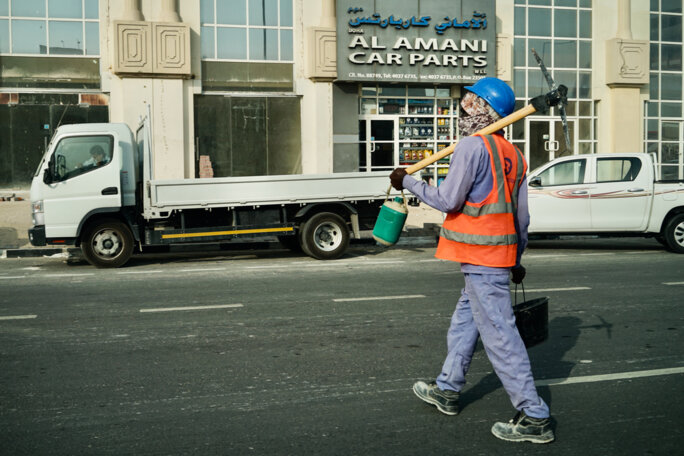
Enlargement : Illustration 2

The Qatari authorities deny these figures and insist that there have been just 37 deaths linked to the construction of the stadiums, and that only three of these were due to a workplace accident. FIFA has been supportive, applauding the Qataris' “very stringent health and safety measures on site” and stating that the “frequency of accidents on FIFA World Cup construction sites has been low when compared to other major construction projects around the world”.
Two months from the opening ceremony, and with the number of calls for a boycott growing, the influential micro state with its formidable 'soft power' would prefer for the issue to disappear off the media's radar. In a statement issued after this article was first published in French a Qatari government official said: “Over the last decade, Qatar has done more than any other country in the region to strengthen the rights of foreign workers. Hundreds of thousands of workers have benefited from Qatar’s actions made in consultation with international experts including the ILO, trade unions and NGOs.
“Reforms include a new national minimum wage, the removal of exit permits, the removal of barriers to change jobs, stricter oversight of recruitment, better accommodation, and improved health and safety standards including mandatory annual health checks. Qatar has also worked with labour-sending governments to tackle exploitative practices before workers arrive in Qatar.”
The official noted: “There has been a consistent decline in Qatar’s mortality rate because of our region-leading health and safety programmes. ” (Read the statement in full here.)
One of the state's communications specialists also told Mediapart: “Qatar has been a pioneer in the region, it has improved the life of foreign workers considerably.”
On hearing this Muhammad looks to the heavens, describes it as an “enormous lie” and lights a cigarette. “This World Cup is the dirtiest and most bloody in history,” he says. “When one of us dies on a worksite Qatar doesn't carry out an investigation, doesn't order an autopsy and doesn't seek to understand why a young man in good health dies suddenly. You won't see 'work-related accident' written on a death certificate. It's always disguised as a natural death, the fault of the dead person who is labelled as having had poor health, a weak heart or respiratory issues. The family must never be able to seek justice, to seek compensation from the employer or the state.”
The NGO Amnesty International made the same observation in August 2021 having examined the death certificates and investigated the deaths of six Nepalese and Bangladeshi men all previously in good health. Manjur Kha Pathan, aged 40, worked 12 to 13 hours a day as a truck driver in terrible heat and complained that the air conditioning in his truck's cab was faulty. His complaints were in vain. He collapsed in his accommodation on February 9th 2021 and died before the ambulance could arrive, Amnesty reported.
Sujan Miah, 32, worked as a pipe fitter at a site in the desert. His workmates found him dead in his bed on the morning of September 24th 2020. On each of the four days leading up to Sujan Miah’s death temperatures had exceeded 40°C. Back home the families of all these men were devastated. They had lost a son, a husband, a father or a brother but they had also very often lost their main source of income too.
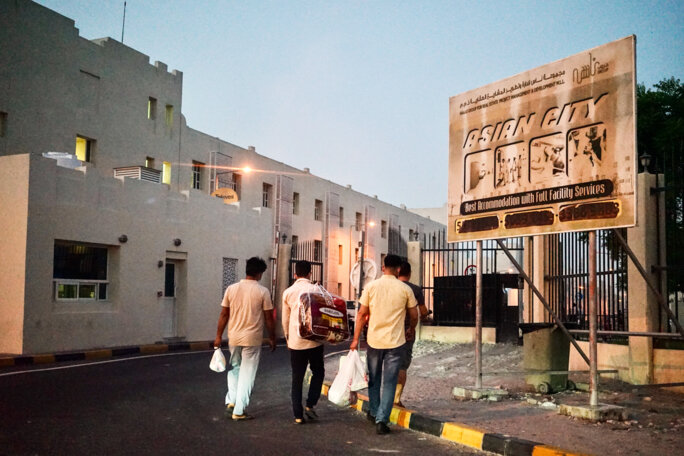
Enlargement : Illustration 3

“Going back to our village in a coffin, that's what we all dread. In my home region lots of men go back straight to the cemetery,” says Muhammad. He comes from an Asian country that has a reputation for supplying the most compliant and cheapest workers, works for a Qatari construction firm which has handed over control to executives from the Middle East, and earns each month the equivalent of 340 euros for working eleven hours a day, six days out of seven.
Like all the workers whom Mediapart met he speaks under an assumed name, preserving his anonymity, fearing tough reprisals from the Qatari regime against him and those he helps in an informal and clandestine way. These are his “brother slaves”, people relegated to the margins in the desert and the dust, far from the city centres, from normal life, from everything.
We were working like slaves from four o'clock in the morning.
Regarded simply as units of production, these slaves are stripped of any privacy as they cram in their thousands or even tens of thousands into the “labour camps” rented out by their employer. These are sordid and overcrowded camps, some of which lack running water and electricity, planted in the middle of polluted industrial zones and placed under strict surveillance. They are surrounded by high walls, wire fences, guards, cameras and informers.
Lined up alongside the huts where the workers sleep are ranks of white Tata buses or minibuses, chartered by the construction companies, which take the workers to the scaffolding at dawn and return them to their sleeping quarters at dusk.
Mediapart was able to gain access to one of these camps, one of the more “presentable” from the outside, at Barwa El-Baraha.You cannot enter this concrete monstrosity without showing your identity. This accommodation, which houses more than 50,000 migrant workers, most of them from Bangladesh, was built to the south of Doha around ten years ago to respond to the international outcry that existed even then about workers' conditions, but it still has the same goal – that of segregation.
Work-sleep-work. The system practised here has “inherited some United States segregationist practices imported (to the Gulf) by the oil company Aramco in Saudi Arabia at the end of the 1930s,” according to the French academic Tristan Bruslé. It is designed to isolate, exclude and control, and provides no escape routes for these labouring classes who only matter because of their capacity for work.
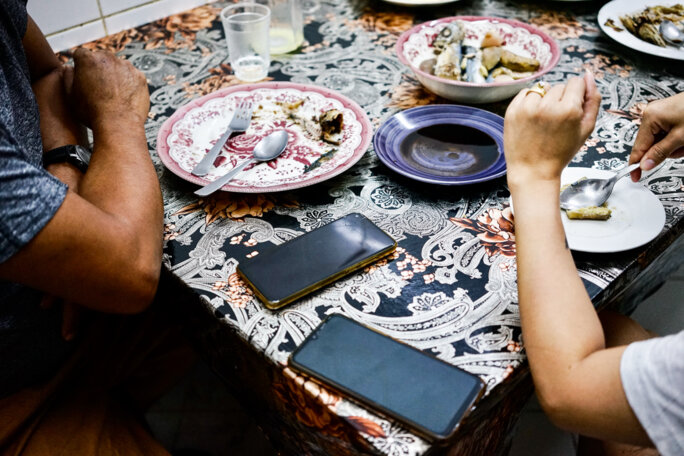
Enlargement : Illustration 4

“We're like rats who mustn't approach either the Qatari castes nor the Western expatriates,” notes Muhammad. For a long time he lived in one of these run-down ghettos, segregated on ethnic and gender lines where only men live. That was until he changed employer and received an allowance of 100 euros that enables him to live in this shared accommodation in a working class area of the suburbs of Doha.
He now shares the building with Indians, Filipinos, Kenyans, Ghanaians, Malians and people from the Ivory Coast, all of them construction workers. In his lodgings there are around ten of them divided between two bedrooms which have been altered to make four. One of the rooms has air conditioning, but not his.
Instead, Muhammad has to make do with a fan. The kitchen is shared but each person has their own cooking pot, rice, curry and soft drinks kept at the foot of their beds, where columns of cockroaches come and go. Hari is now thanking his host non-stop for having taken him in. Sitting on the floor against the wall, under the wan light of a neon light, he tries to hide his distress and hold back the tears. He has not sent a cent back to his family in Nepal for five months, neither to his wife and their three children nor his parents, who are all forced to live in poverty in the mountainous country.
He usually sets aside nearly all his salary for them, an income much lower than he was promised back home: 1,200 rials a month (about 320 euros) that he earns by toiling in oppressive heat, sometimes with no shade, between ten and fourteen hours a day, six-and-a-half days a week.
That is a lot more than is agreed in his contract and a lot more than the maximum hours set by the Qatari Labour Code, which itself is above the norms set by the International Labour Organization (60 hours a week). All he keeps for himself is money for food – which should be provided by his company – and for his mobile internet connection.
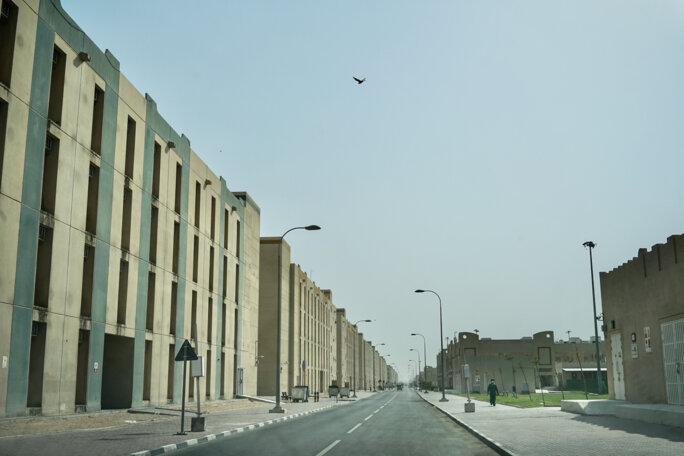
Enlargement : Illustration 5

For the past five month Hari's employer, a Qatari subcontractor for a conglomerate working on several sites in the Lusail 'city of the future', has refused to pay him or his colleagues. The subcontractor complains about lack of funds, an argument that is widespread in an emirate that is one permanent worksite, in which there are record numbers of subcontractors, and where companies and investment funds from around the world offload their responsibilities onto the backs of the workers.
Hari is losing sleep over the situation. Not only is he not sending money to his family, he is also increasing his debt. Six years also, in order to escape Nepal's extreme poverty and go to Qatar - even though he was aware it was no El Dorado - he took out a loan with the village's money lender for the 2,000 euros he had to pay a recruitment agency to get work.
These exorbitant and quite illegal costs often plunge the workers' families back home into debt. This means the family itself can then be pressed into service by the money lender if the worker cannot repay the money that gave them the “right” to go and work in Qatar. They often cannot do so because they have been killed by the grinding process of exploitation.
Resistance springs up
Muhammad tries to reassure Hari. “Have a rest, we'll find a solution.” Neither a lawyer nor a trade unionist, Muhammad is simply a fellow sufferer who during the course of his exile and the tyranny he endures has decided to do the best he can, and has learnt the relevant law as he goes along. Supported by the main union from his native country, he has without realising it become one of the activists whose mobile phone number is discreetly passed on, from bunk bed to bunk bed, among the exploited.
He represents individual and collective resistance, the solidarity inside and between communities that bravely and illegally springs up to loosen the tentacles of this anti-social authoritarian “gas-monarchy”. This is a state under the control of the al-Thani dynasty, which is known for its oppression not just of workers but of women, gays and any opposition too.
This feudalism bans strikes and trade union activity and quells all protests and rebellions. That was was highlighted in August with the indefinite expulsion of several dozen Bangladeshi, Indian and Nepalese serfs who were 'guilty' of having demonstrated – a very rare occurrence - to demand the salaries which they had not been paid for seven months. “We won't start a revolution but we can improve lives,” says Muhammad.
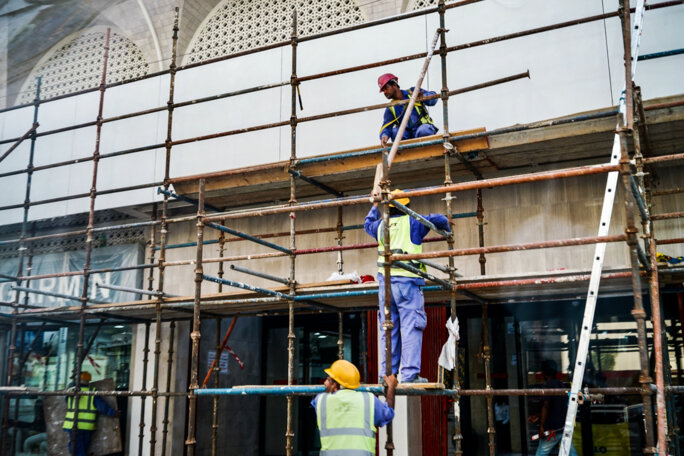
Enlargement : Illustration 6

Muhammad is in his forties, has three children whom he is watching grow up via WhatsApp and a wife whom he calls every day, often in tears. “I break down, I see too many horrible things,” he explains. These include late or non-payment of salaries, appalling work shifts that threaten the health and safety of the employees, slave labour and fraud. Despite some changes, Qatar remains a journey to hell for migrant workers, one that sees them enduring the worst abuses, the worst breaches of human, economic and social rights.
In a bid to silence critics before the first football World Cup ever held in the Middle East and on Muslim soil, an event on which it has spent more than 200 billion dollars, the gas emirate has indeed introduced reforms in recent years. But these still fall far short of international norms, and the minimum salary that it has imposed remains extremely low even though the cost of living is high: 1,000 rial or around 260 euros a month.
I'm going mad, I'm like a prisoner in this country.
Qatar has also announced the creation of specialist labour dispute committees and established a workers’ support and insurance fund for unpaid workers. The ILO says that since its inception in 2018 this system has paid out more than 160 million dollars to more than 40,000 workers from different sectors. But according to accounts heard by Mediapart the system is a hard one to navigate and continues to view the employer as all-powerful; and the employees as disposable.
The symbol of this is the 'kafala' system of sponsorship-based employment. In 2020, to acclaim from FIFA and the ILO – which in 2017 agreed to waive a complaint against forced labour in return for the establishment of an ILO office in Doha – Qatar announced it was abolishing this old practice. The kafala is a system that dates back to another age. In Islamic law it was a form of guardianship extended to non-relatives, but which on the Arabian peninsula became over time a horrifying right to ownership and subjection by an employer (otherwise known as kafeel in Arabic, meaning 'sponsor') over their employee.
The reforms meant there was no longer a legal requirement to get a permit or kafeel to be able to leave the country. Nor is there now a legal requirement to get the employer's written permission to change job. This was known as a No-Objection Certificate (NOC), and it attested to the worker's “exemplary behaviour”.
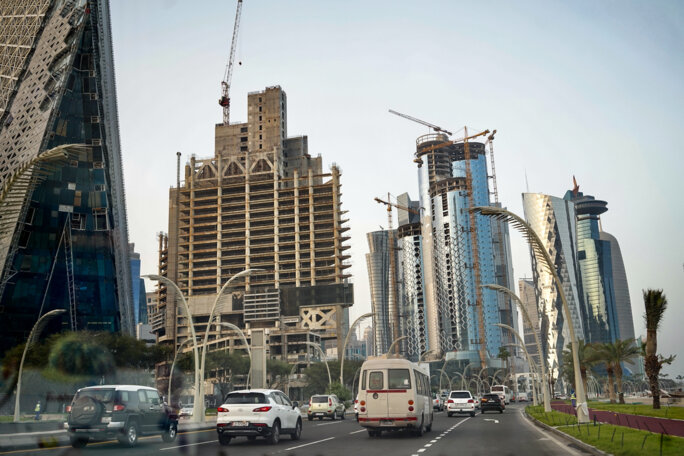
Enlargement : Illustration 7

But the reality on the ground is very different, and the law has struggled to make an impact because there is no system of sanctions and monitoring to enforce it. As a result the kafala system, which is deeply rooted in society, is still used. Some employers continue to place obstacles in the way of their employees - by requiring NOCs and confiscating their passports - in order to keep the workers tied to them.
“Our system still isn't perfect. There are some uncooperative private companies, but as soon as they are flagged they're automatically put on the blacklist,” said a source inside the Qatari administration.
The chain of exploitation
Indeed, the accounts collected by Mediapart reveal widespread abusive practices still taking place in a climate of impunity. Hari fears that having expelled him from the labour camp because he dared to ask for his salary to be paid, his 'sponsor' will now cancel his residence permit and report him to the police for having 'fled'. This is a criminal offence which could see him placed in custody and even deported back to Nepal.
“This is, unfortunately, standard blackmail, I get reports of it every day,” sighs Muhammad, showing the notebook in which he has recorded dozens of cases of workers swindled by their kafeel. At this moment a young man from Uganda wearing shorts and flip-flps, a room-mate whom Muhammad is also advising, pokes his head through the doorway.
'Oumar' is in conflict with his “torturer” who makes him work outside in the middle of the summer at hours that are forbidden by law because of the extreme climate (between 10am and 3.30pm) or who marks him as absent when he takes a break. The Ugandan worker is owed four months back pay and has been told he cannot change his job unless he pays 5,000 rials or nearly 1,400 euros for an NOC, an astronomical sum that he doesn't have. This is another common form of blackmail practised here.
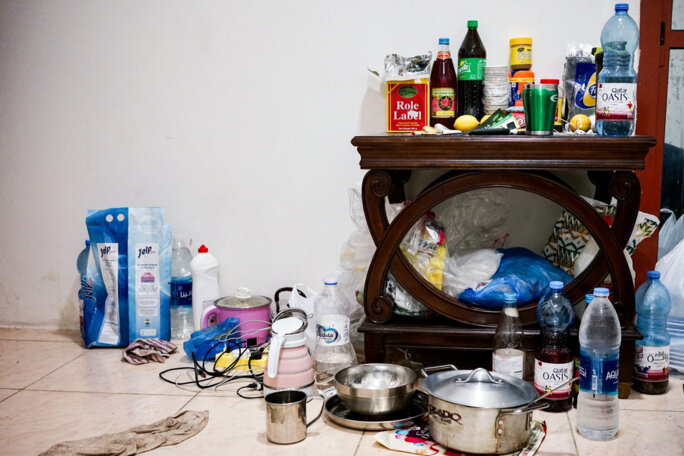
Enlargement : Illustration 8

Ideally Oumar should make an official complaint but his boss threatens to do the same against him. “In just one click, via an app, he can destroy him, cancel his residence permit, accuse him of fleeing or theft, without having to produce any evidence,” explains Muhammad.
Like the overwhelming majority of workers in such cases, Oumar prefers to let it drop. He is very depressed. Last month his five-year-old son died of leukaemia but he was not able to return home to the hills of Kampala to be there. Instead he followed his son's burial, the cries, the tears, by phone. “I'm going mad, I'm like a prisoner in this country,” he says.
Oumar describes the daily racism, the dislike of black people, the fear of the police, the identity checks even when your papers are in order, the colleagues who succumb to black market alcohol, who kill themselves or who try to end it all, just to free themselves from the chain of exploitation.
He takes his phone out of his pocket and shows a copy of his ignored contract and images of the building where he was living. It is in a disgusting state, from the bedrooms to the toilets, covered in dirt and mildew and full of promiscuity. He never wanted to come to the Gulf in the first place but felt compelled to by unemployment. “I lost my job as a salesman. I couldn't find anything else. Over there it's not a crisis, it's total poverty, I had to find money,” he explains.
Oumar loves football. He enjoys watching a match with his room-mates, eating chips, but above all he loves to play. A recruitment agency in Kampala offered him what they said was the chance to become a professional footballer in Qatar at a cost of 3,500 rials (about 1,000 euros) in fees. He fell into the trap. “When I arrived I was sent to the factory. My family told me to keep my mouth shut, to use the opportunity to bring back some cash. I was also already in debt,” he says.
'Kofi', one of his colleagues, was a victim of the same fraud in Ghana. He paid an almost identical sum to an agency who lured him with the promise of a career in the sport using Qatari as a mirage. “They told me that it was a country where it was easy to break through thanks to the good infrastructure and the poor level of the locals,” he says. When he finally discovered the deception it was too late, he was already caught in the trap and snared financially.
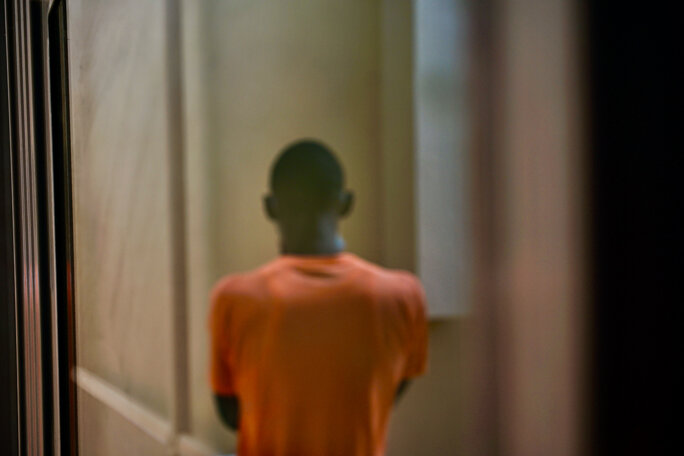
Enlargement : Illustration 9

Kofi ended up working with a hard hat and overalls from dawn to dusk on the shell of one of the eight World Cup stadiums for 900 rials (240 euros) a month. This was the Al-Janoub stadium in the port city of Al-Wakrah south of Doha, another stadium inspired by a dhow. It will seat 40,000 people and was built in record time.
“We worked like slaves from four o'clock in the morning,” recalls Kofi, who took to drinking the energy drink Red Bull to cope with the strain. “One day in October 2017 there was an inspection a year after the death of a worker. International trade unionists came with the Supreme Committee [editor's note, the Qatari body in charge of organising the finals] and suddenly we were well-treated, and given a sun shelter to take breaks, water when we wanted, but it didn't last,” he says.
At least two Nepalese workers have died working on this towering structure. In October 2016 Anil Kumar Pasman, aged 29, died after being struck by a lorry. He was the first victim of a fatal work accident on a stadium to be officially acknowledged by Qatar. In August 2018 Tej Narayan Tharu, aged 23, died when he fell from a high walkway at the stadium. According to sources Tharu was carrying a large board along a 35 metre-high walkway at night when he fell to his death.
That same year, according to a detailed investigation by The Guardian, two other Nepalese men working at the Al-Janoub stadium, both in excellent health according to their families, lost their lives: Bhupendra Magar, aged 35 and 52-year-old Ramsis Mukhiya. Colleagues said they were found dead in their bunk beds at the labour camp in which they were staying. According to their death certificates Magar had died of “acute respiratory failure” while Mukhiya succumbed to “acute heart failure”. No investigation was carried out to try to further explain what had led to their deaths.
Bhupendra was slaving away in Qatar for one reason only: to pay back nearly 4,000 dollars in debt he had accrued in order to get a job in Afghanistan. The job in question there had fallen through and he found himself penniless. Meanwhile Tharu's mother said: “My son has gone for ever. He has a small daughter. How will she survive?”
The same question obsesses Hari about his own family and he does not know what to do next. Should he hide? Or, despite everything, should he return to the camp near Asian City to the south of Doha, which is like another world in this very rich country, a world of the destitute where nearly half a million proletarians have been cooped up? It is an example of segregation at work; the Qatari government ended up allowing an immense mall with 13,000 places and a cricket pitch to be built to provide forms of leisure activities next to where the workers sleep.
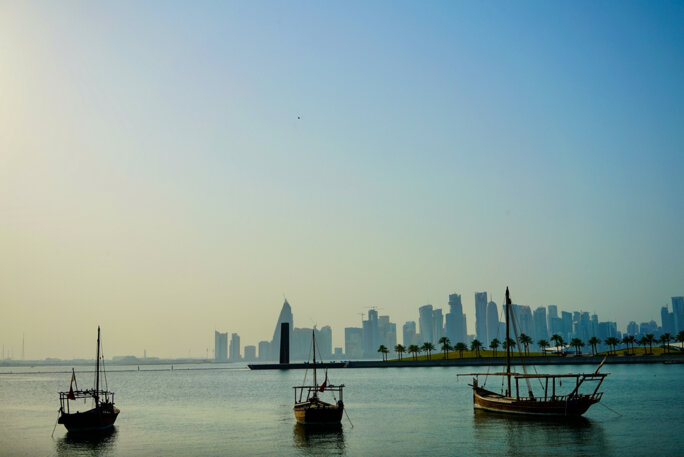
Enlargement : Illustration 10

Muhammad is planning to ask the insurance fund for help but first of all wants to seek the advice of the “network” of helpers. He holds out little hope but he does not tell Hari that. “I listen, I help but often there's no solution, the beast is much too strong,” he privately confides, dejected.
He fears the day after the World Cup when the lights and the glitter of the football event come down. Who will then carry on being angry about the slave conditions of these workers? Without these workers this great celebration of world football with its astonishing television audiences - more than half the world's population watched the finals in 2018 - could not take place. And without them Qatar would not be the ultra-prosperous nation that it is, a tax haven wooed by the entire world, a state which can buy anything it wants – even islands, waves and artificial mountains – and which indulges in a gigantic bling-bling contest with its rival Dubai.
Invisible pariahs they may be, yet these workers are much more numerous in the public spaces of Qatar than the local people in their long white robes - dishdasha - or their black robe-like dresses known as abaya, the traditional garments of the Arabian peninsula. These workers, the vital cogs in the wheel, are everywhere, in their hard hats and fluorescent safety jackets, their faces wrapped in scarves or wearing hoods to deal with the searing heat, as they toil away constructing bridges, roads, luxury hotels, skyscrapers, fan zones, walkways and more.
Muhammad wants to know if “you journalists will come back”. Tomorrow is Friday, his only day off in the week. That is not the case with all his “brother slaves” he says. “Many work seven days a week, unaware that it's a rest day.” He himself does not really get a day off either, as the phone is constantly ringing with fresh calls for help, but he tries to sleep a little, goes and prays at the mosque and makes progress in his reading of the Koran. It is his lifeline.
He says he does not not understand how “human beings in such a religious country can exploit their peers right up to the point of death, and spit on Islamic values”. The other day he came across a hadith or saying of the Prophet: “Give the worker his wages before his sweat dries.” Muhammad says he would like to post that message up everywhere in this world city as it prepares to welcome more than 1.2 million football fans.
-------------------------
If you have information of public interest you would like to pass on to Mediapart for investigation you can contact us at this email address: enquete@mediapart.fr. If you wish to send us documents for our scrutiny via our highly secure platform please go to https://www.frenchleaks.fr/ which is presented in both English and French.
-------------------------
- The original French version of this article can be found here.
English version by Michael Streeter


